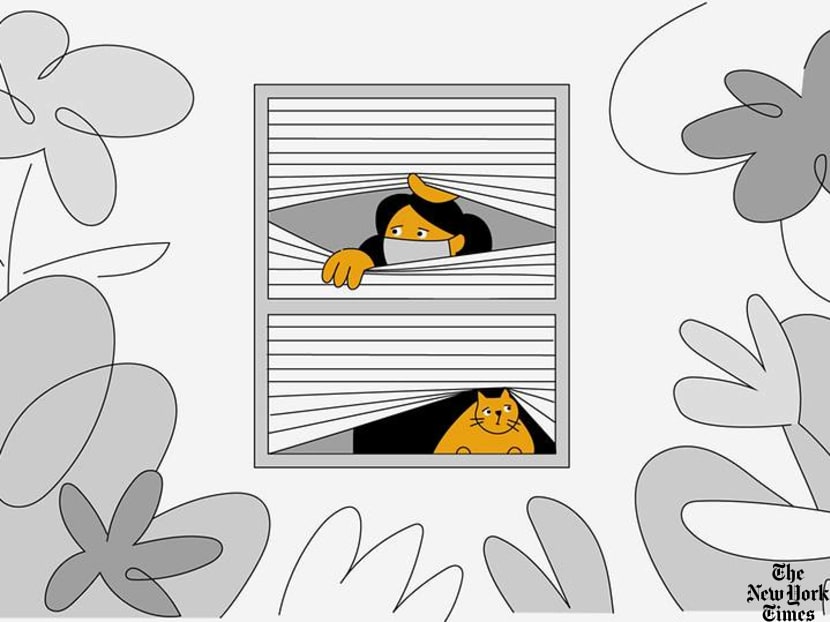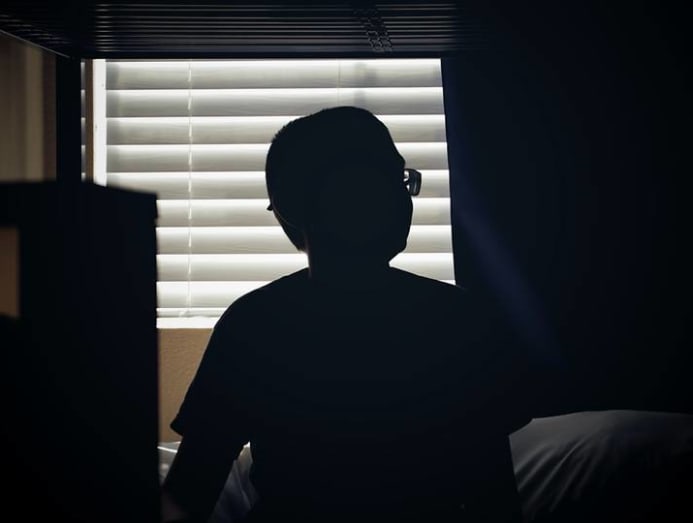Ready to reboot social interactions? Baby steps to get started
Advertisement
Health
Ready to reboot social interactions? Baby steps to go started
Afterward a year spent social distancing, mask wearing and sheltering in place, the prospect of re-adjusting to in-person social engagements tin be a daunting 1.

(Art: The New York Times/Cecile Gariepy)
As vaccination shots reach more arms, yous may be looking ahead to getting out and nearly. An Axios-Ipsos poll released this month found that "the number of Americans engaging in social interactions exterior the dwelling house is increasing".
But after a year spent internalising public wellness precautions for social distancing and mask-wearing, the prospect of re-adjusting to in-person social engagements may be a daunting one.
For many, information technology provokes a sense of profound discomfort, apprehension or ambivalence.
"Information technology's a new version of anxiety," said Dr Lucy McBride, an internist in Washington, who writes a newsletter nigh managing the coronavirus crisis. You may discover that your continuing concerns about the virus are colliding with a new fix of worries about seeing others more regularly: What am I comfortable with? How practise I human action? What do I say?

"There'due south two feelings that are continuing to be for me," said Allison Harris-Turk, 46, an events and communications consultant and female parent of 3 in San Diego. Harris-Turk created the Facebook group Learning in the Time of Corona, where many among the roughly 16,700 members are discussing the pros and cons of re-entry.
"There's the excitement and the optimism and the hope, and so there's besides the grief and the trauma and 'oh, my goodness, how are we going to recover from this?'."
Here's how some individuals and experts are starting to call up about closing the social distance.
START Minor
Though y'all may exist chafing at the confines of the lockdown, retrieve that it's still non entirely safe to resume social activities equally before. Even though 75 per cent of the staff may return to the office subsequently Apr 5, you're however required to keep social groups to no more than than 8.
If you're wary of re-entry, begin with a lower-stakes outing. "It's similar little baby steps getting back into it," said Dr David Hilden, a Minneapolis-based internist, who hosts a weekly radio show during which he answers listeners' pandemic questions.
When we accept to really focus and plan what we're doing, that comes with an experience of mental endeavor. Information technology feels similar a mental fatigue.
He'due south observed this immediate: Earlier this calendar month, he met up with a friend to share a beer for the first time since the onset of the pandemic.
"Now that we've dipped our toe in the h2o, a lot of Zoom meetings cease with, 'Hey, I think we can become together now'," he said.
Empathize THAT HANGING OUT MIGHT TAKE More than EFFORT
After receiving her first shot of a coronavirus vaccine, Aditi Juneja, a New York-based lawyer, expected to feel the same alluvion of relief that some of her peers had described after getting theirs.
While on the phone with a friend, she started to consider future belatedly nights and travel to far-off destinations. "I was like, 'Human being, I want to dance on bars'," Juneja, 30, said. "There was a euphoria about imagining the possibilities."
READ: How to combat the epidemic of loneliness from a safety altitude
But after 10 minutes, she found even the fantasy versions of these scenarios exhausting. The reality can be, too; she described the sensory overload and disorientation she felt while dining outdoors with a friend for the first time in months. "I call up our ability to take inputs has really lowered," Juneja said.

This is especially true for individuals suffering from social anxiety, for whom the lockdowns accept offered some relief, and for whom reopening presents new stressors. But even extroverts may experience an adjustment period every bit our brains adapt to planning and monitoring responses to unfamiliar situations.
At the beginning of the pandemic, people had to change their behaviours to comply with social distancing, mask-wearing and sheltering in place. But learning those new behaviours – and at present, relearning old ones – can take a cognitive price.
Write down the boundaries that y'all would like to attach to and take time before agreeing to someone else's programme.
"Social settings are particularly demanding," said David Badre, the writer of the book On Task: How Our Brain Gets Things Done, and a professor of cognitive, linguistic and psychological sciences at Brown University.
"When we have to really focus and program what we're doing, that comes with an experience of mental endeavor," he connected. "Information technology feels like a mental fatigue."
There is good news, still: You'll most likely find it easier to relearn erstwhile behaviours than learn entirely new ones. "The central is to non avert that endeavor," Dr Badre said. "Past re-engaging, you volition get used to it again."
Gear up BOUNDARIES FOR YOURSELF
Though the past month has seen a spate of re-openings, some scenarios might even so ready off a siren in your head. And because these facilities are open, doesn't mean you demand to go.
Just what if a friend or family member does want to encounter a moving picture, or dine out? If y'all limited disagreement over what is safe, you might experience equally though you are implying your companions are less responsible or unethical.
READ: Why but imagining your hereafter travel plans tin can have some surprising benefits
Sunita Sah, a professor at Academy of Cambridge and Cornell University has researched this phenomenon, which she calls "insinuation feet".
In studies, Dr Sah has constitute that patients frequently follow medical communication from their doctor fifty-fifty if they believe their doctor to have a disharmonize of interest, and that job candidates often respond interview questions they know are illegal to inquire. These reactions come partly out of business organisation that to disagree would suggest the other person – the medico or the job interviewer – is not trustworthy.

A like state of affairs can play out if you're confronted with someone whose attitude toward public-wellness protocols differs from your ain.
Dr Sah'southward research has shown that when individuals have the opportunity to weigh their decisions in private, they are less likely to experience this anxiety and do something that makes them uncomfortable.
She recommended writing down the boundaries that y'all would like to attach to and taking time before agreeing to someone else's plan.
READ: What's it really like to quarantine in a hotel? Tales from around the world
"Appraise your own risk level and comfort," Dr Sah said, "and so yous're very clear about what you would and would not like to practise." This will also provide yous with a clear document of how your comfort levels are changing over fourth dimension as yous readjust.
Caryatid FOR TOUGH CONVERSATIONS
Safe distancing measures have created friction between couples, families and friends, and prompted individuals to enquire challenging, and sometimes, seemingly intrusive questions. Now, you may exist adding "Are you lot vaccinated?" to that listing.
Nonetheless, information technology volition continue to be of import to take these conversations in the coming months.
"This isn't abstract," said Marci Gleason, an associate professor in the Section of Human Development and Family unit Sciences at the Academy of Texas at Austin, whose lab has been surveying relationships in quarantine.
READ: Stressed out, anxious and unable to focus? Here are 10 ways to at-home down
Sometimes, it can feel similar a proxy battle over how much y'all value each other's friendship. Exist open nearly your own fears and vulnerabilities, and make information technology clear that when you disagree, y'all're expressing your own preference and non rejecting the other person.
Keep it elementary, too, especially with friends or relatives with whom y'all don't oft have emotional, aboveboard talks.
This empathy and candour volition also be an nugget if you find that your friends and peers have adult the tendency to over-share, either out of feet or being starved for chat. (You may be doing information technology yourself, too.) If a chat subject area makes yous uncomfortable or anxious, say then.

"Beingness actually open up and direct is the all-time fashion," said Dr Danesh Alam, a psychiatrist and the medical director of behaviour health services at Northwestern Medicine Central Dupage Infirmary.
Dr Alam suggested studying up for conversations, preparing some questions and topics in order to chat with more intention, and continue things on topic.
TAKE YOUR Fourth dimension
It's okay if you don't feel prepare to run into people socially again. Through the challenges of the lockdown period, y'all may take found that "your mental wellness is served best when y'all accept time for calm and residuum and introspection", Dr McBride said.
And then pace yourself while considering the benefits of getting back out there: Even coincidental interactions have shown to foster a sense of belonging and community.
"Social interaction is critical to our existence," Dr Alam said. Remember, too, that there are bound to be some weird moments as you start seeing others more regularly and your pandemic instincts (no hugging) and before-times instincts ("Do you want a bite of this?") collide.
"If you're comfortable going to a dinner at a small family eatery, you lot can exercise that," Dr Hilden said. "If you want to wait a month or 2, that's okay, besides."
By Katherine Cusumano © The New York Times
This article originally appeared in The New York Times.
https://www.nytimes.com/2021/03/27/at-dwelling house/retraining-for-social-interactions.html
Recent Searches
Trending Topics
Source: https://cnalifestyle.channelnewsasia.com/wellness/ready-reboot-social-interactions-baby-steps-get-started-237836

0 Response to "Ready to reboot social interactions? Baby steps to get started"
Post a Comment